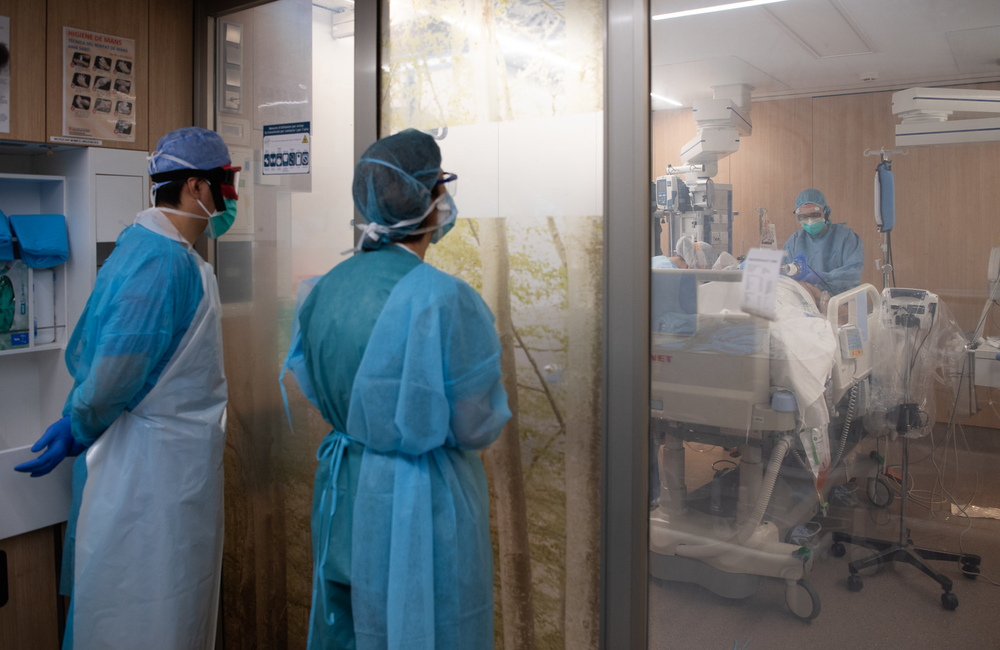
People with HIV were more likely to be admitted to hospital with COVID-19 and more likely to die in hospital due to COVID-19 than people without HIV, and people with more advanced HIV disease or unsuppressed viral load were more likely than other people with HIV to be hospitalised, a review of surveillance data in New York state shows.
The study provides data on a diverse population of people living with HIV in a state that bore the brunt of the first wave of the COVID-19 pandemic in the United States during spring 2020. Just under half of people living with HIV in New York state are Black, around three-quarters are aged 40 or over and around one-third are women.
The findings are published as a pre-print article at MedRxiv and have not been peer reviewed.
Studies in various countries have produced conflicting evidence about COVID-19 risks in people with HIV:
- A large South African study found that people with HIV had a higher risk of dying from COVID-19, as did two UK studies. The two UK studies came to different conclusions about how much HIV raised the risk of death.
- A US study found that if people with HIV were at higher risk of dying from COVID-19, it was explained by underlying health conditions, not HIV-related factors.
- A study in the UK found that Black people with HIV had a higher risk of being admitted to hospital with COVID-19. Another UK study found that if admitted to hospital with COVID-19, people with HIV did not have worse outcomes.
It remains unclear if people with HIV are more likely to acquire COVID-19 and whether people with low CD4 counts or unsuppressed viral load have higher risks of severe illness.
To investigate these questions, researchers in New York state Department of Health and the State University of New York matched data from three state-wide databases to give a comprehensive picture of COVID-19 risks in people with HIV. Using the state HIV surveillance database, which records all diagnosed people with HIV in the state (108,062 people), they matched laboratory-confirmed COVID-19 diagnoses to diagnosed HIV infections. COVID-19 diagnoses were also matched to hospital admissions and deaths in hospital in the state.
The analysis covers all cases of COVID-19 diagnosed between 1 March and 7 June 2020. During the study period, 375,260 cases of COVID-19 were diagnosed in people without HIV (a rate of 19.4 per 1,000 people) and 2,988 in people with diagnosed HIV infection (a rate of 27.65 per 1,000). After adjusting for age, sex and region, there was no significant difference in the rate of diagnosis between people with HIV and others (adjusted rate ratio 0.94 [0.91-0.97]).
The rates of hospitalisation and death in hospital from COVID-19 were higher in people with diagnosed HIV. Almost 900 people with HIV were admitted to hospital with COVID-19 in the state up to 7 June and people with HIV were significantly more likely to hospitalised due to COVID-19 after adjusting for age, sex and location (adjusted RR 1.38 [1.29-1.47]).
Two hundred and seven people with HIV died of COVID-19 in hospital; people with HIV were more likely to die in hospital with COVID-19 after adjusting for age, sex and location (RR 1.23 [1.07-1.40]). To put the 207 deaths in context, in the same time period in 2019, 490 people with HIV died in the state.
However, this death rate includes people hospitalised for other reasons who died in hospital with a COVID-19 diagnosis. Using a stricter definition – deaths from COVID-19 among people admitted to hospital with a COVID-19 diagnosis – the researchers found no difference in the death rate between people with HIV and people without.
“People with low CD4 counts or unsuppressed viral load were especially likely to be hospitalised.”
Among people with HIV, the rates of COVID-19 diagnosis, hospitalisation or death did not differ according to transmission category or sex. As in the general population, rates of hospitalisation and death were higher in older age groups. Compared to white non-Hispanics, Black and Hispanic people were at higher risk of being diagnosed with COVID-19 but not of hospitalisation or death.
The study also looked at the rates of diagnosis, hospitalisation and death in hospital among people with diagnosed HIV infection according to CDC disease stage and viral load.
- Compared to people with HIV in CDC stage 1 (most recent CD4 count above 500), people in stage 2 (CD4 200-500) had a significantly higher rate of hospitalisation (aRR 1.27 [1.09-1.47]) but not of COVID-19 diagnosis or death.
- People in CDC stage 3 (CD4 count below 200) had a higher rate of diagnosis (aRR 1.38 [1.21-1.59] and hospitalisation (aRR 1.54 [1.24-1.91]) but did not have a higher death rate compared to people with CD4 counts above 500.
- People with unsuppressed viral load at their last test had a higher rate of hospital admission (aRR 1.30 [1.04-1.62]) but not of death in hospital, and had a significantly lower rate of COVID-19 diagnosis (aRR 0.70 [0.61-0.80]).
The researchers conclude that in New York state, people living with HIV were not diagnosed with COVID-19 at a higher rate than the rest of the population and did not die at a higher rate if admitted to hospital. But people with HIV were more likely to be admitted to hospital and people with low CD4 counts or unsuppressed viral load were especially likely to be hospitalised.
The study investigators stress that their ability to interpret the results is limited by a lack of information about comorbidities, socio-economic factors and risk factors for COVID-19 exposure. They say more research is needed to understand how these factors affect COVID-19 in people living with HIV.
